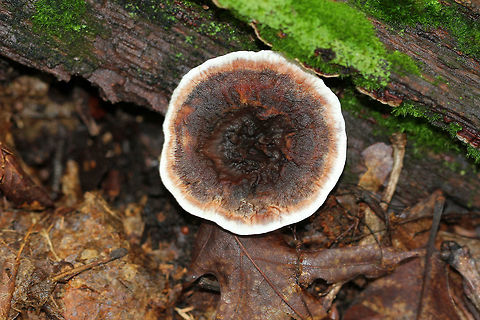
Appearance
Fruitbodies of ''Hydnellum scrobiculatum'' have centrally depressed caps measuring 2–6 cm in diameter. These caps can fuse together to form concrescent fruitbodies. The caps have wavy edges, and an initially felty surface that becomes scaly with age. Young fruit bodies are white, then pinkish-brown, then purplish brown, sometimes with white margins. Fruitbodies can become shiny in age.The spines on the cap underside are up to 4 mm long. They are initially white, but become purplish brown in maturity. The spines are decurrent—they run down the length of the stipe. The stipe, which is roughly the same color as the cap, measures 2–3 cm long by 1–1.5 cm thick. Mycelium at the base of the stipe envelops and grows around forest litter. The flesh smells mealy . The edibility of the fruitbody is unknown, but in general ''Hydnellum'' species are too acrid and woody to be palatable.
Like all ''Hydnellum'' species, ''H. scrobiculatum'' produces a brown spore print. Individual spores have a more or less spherical shape, with dimensions of 5.5–6.5 by 4–5.6 μm. They have wart-like projections on the surface. The basidia are narrowly club-shaped, four-spored, and measure 23–29 by 5–6.5 μm.
Naming
There are several species that ''Hydnellum scrobiculatum'' is often confused with—especially older specimens. These include ''H. spongiosipes'', ''H. ferrugineum'', and ''H. concrescens''. The latter species is particularly similar to ''H. scrobiculatum'', a fact that has been highlighted by conservation efforts in the UK.Distribution
''Hydnellum scrobiculatum'' fruits singly, in clusters, or in fused groups in both coniferous and mixed forest. It is found in Asia, Europe, and North America. In the United Kingdom, it is considered vulnerable according to the biodiversity action plan for stiped hydnoid fungi, and endangered according to the Red Data List.Habitat
''Hydnellum scrobiculatum'' fruits singly, in clusters, or in fused groups in both coniferous and mixed forest. It is found in Asia, Europe, and North America. In the United Kingdom, it is considered vulnerable according to the biodiversity action plan for stiped hydnoid fungi, and endangered according to the Red Data List.References:
Some text fragments are auto parsed from Wikipedia.